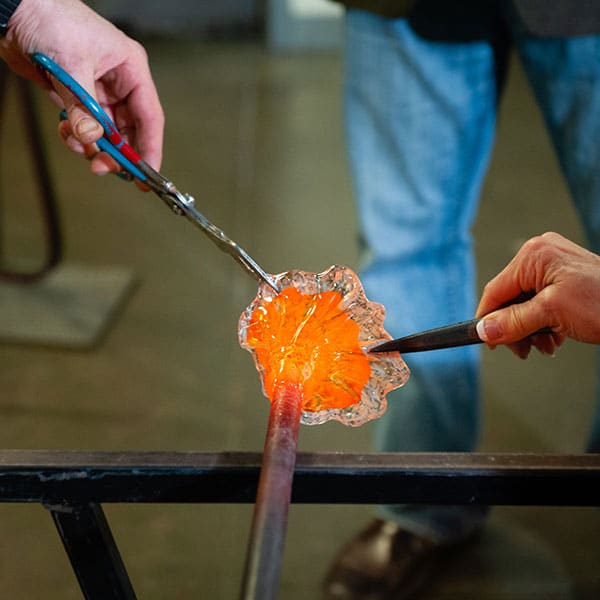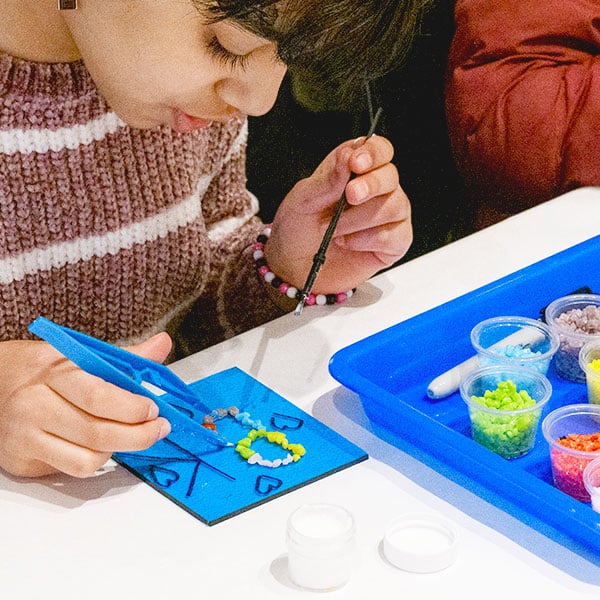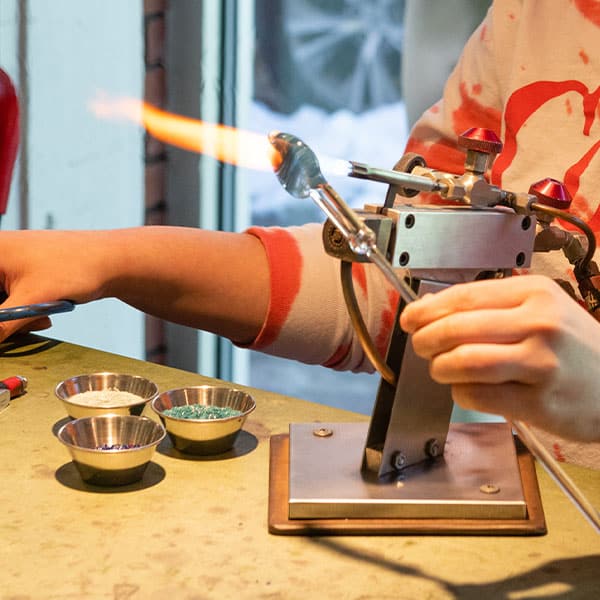Programs and Residencies
As a hub for creativity and educational outreach, Pittsburgh Glass Center is committed to supporting glass artists at all levels and expanding public appreciation of what glass artists do. We offer artist-focused programs including various residencies for glass artists and nonglass artists, the Ron Desmett award, and the Tech Apprentice Program. Plus there are many opportunities to teach and sell your art in our shop.
Teaching Opportunities
We are always looking for experienced glass artists to teach classes and workshops, lead onsite and offsite glass demonstrations and tours, as well as assist with production and other special projects in all of our glass studios. Learn more about our teaching opportunities.
Retail Opportunities
An important part of our mission is to cultivate, nurture and support diverse and passionate glass artists and provide opportunities for them to make and exhibit their work in Pittsburgh and beyond. The Shop at Pittsburgh Glass Center showcases both aspiring and established glass artists, makers, and designers who are amazingly creative and genuinely committed to preserving the true essence of “made by hand.” If you are interested in selling your artwork in our shop, please complete this form and we’ll contact you.
About Our Residencies
Due to funding cuts that are creating unforeseen budget challenges, we are not able to award residencies to our usual capacity at this time. We are currently working to figure out how we can still support artists in a meaningful way while navigating these challenges. Applications are still being accepted for the Ron Desmett Award (see below) which will continue to be awarded on a yearly basis in June.
Pittsburgh Glass Center has facilitated over 210 artist residencies. Learn more about our past residencies.
Eligibility
Anyone over the age of 18, working in any media and from anywhere in the world is welcome to apply for a PGC residency.
Deadlines
We have a rolling deadline so you can apply anytime.
Because the application deadline is rolling, sometimes when you apply, a group has just been juried, and your application will have to wait until the next round. If that is the case, it may be several months until you hear back from us. If you get your application in right before a jury convenes, it might be as quickly as a few weeks. The Jury reviews applications quarterly.
Exhibitions Connected to a Residency
If you are interested in also having an exhibition of your work in PGC’s Hodge Gallery, please indicate that preference in your application.
The most common reason for rejections of applications is the simple fact that they are incomplete!
When the programming committee reviews residency applications they are looking at the written components as well as the images included.
Here are a few things to consider for the written sections and the images: The written components are broken into 3 sections, artist statement, project description, and bio:
- Artist Statement: Explain your artwork and how it relates to this residency. In a paragraph or two try and describe what is important to you in making your work, some insight into your decision making process and how this residency proposal fits into that narrative. A couple of questions the committee always contemplates when viewing artist residency applications are: Why PGC? And Why Now?
- Project Description: Please explain what you plan to do and what you hope to achieve. Be clear and consider addressing what studios you will work in, the amount of time needed for the project, how much help you need achieving the project and any other relevant details. This is an opportunity for you to lay out how you see this residency working. Try to think through as much detail as you can to provide the committee with. If you are familiar with glass, outlining how long in separate studios you are proposing, how many assistants and for how many days, any supply needs that you would want covered. If you are unfamiliar with working with glass, try and detail any related experience(such as mold making in other materials) and where you would need technical assistance. This scope will help the committee not only get a sense of the resources that will be needed to facilitate the residency but also of how this could fit into or impact PGC’s day to day schedule.
- Biography: Include a paragraph of text about yourself and your experience. This is a chance to talk about yourself and your experience as an artist/craftsperson. What got you interested/started into making, where you are and where you hope to be in the future.
- The images: Include 10 images! Include a few detail shots of your best works if you’re not sure if you have enough separate pieces you want to include.
- If you are not submitting glass, include images of your other artworks.
- Include images of sketches, renderings, plans of what you will be doing during your residency. The more visual information you can supply to help support your written project description the better.
- The images do not all have to be related to the type of work you plan to do in your residency. We would prefer to see you demonstrate your work as an artist/ craftsperson at your highest level, regardless of technique.
- Do the best you can with the images themselves, we understand that not everyone can afford to have their work professionally photographed. Some things to consider when shooting your photos: LIGHT!! Make sure there is good light, outside can be a great option for getting enough light. Clarity, make sure you have the image or the detail of the image in focus. Background, using a neutral or white background can really help distinguish the colors.
- Make sure to add text to give the photos context related to title, materials used, date, and scale.
- If you have tried multiple times to upload photos and are struggling with the upload requirements, you can also email your images to Jason.
Our residency program is usually booked about 8–12 months in advance. Each year we may accept a different number of resident artists. Determining factors include how many great applications we get, how long each residency is, and what other things we have going on in the studios. Some years, we may have as many as 6 artists in residence, other years only 1.
The Residencies may vary in length as it may depend on how long it takes to complete the project. Generally, our residencies last between 2 and 16 weeks, but we have hosted artists for as few as 3 days and for as long as 6 months.
For more information on our equipment, check out our studios.
PGC offers free access to our world-class studios; basic supplies, like clear glass, plaster, grit, etc.; and housing in our artist house, next door to PGC.
Idea Furnace for Nonglass Residencies
We enjoy working with nonglass artists to help them realize their ideas. We invite artists with little to no knowledge of glass to apply for residencies in our studios to learn different ways to work with and incorporate glass into their practice, experiment with ideas, and to create with the help or facilitation of professionals in a state-of-the-art studio. Our exchange regularly leads to mutual learning opportunities.
Residencies may include instruction across various glass studios for those looking to learn new skills or access to professionals if artists are looking to design and have works made for them.
Spark Sessions are collaborations that lead to amazing creative alliances and truly inspired works. Frequently, we invite nonglass artists into the studio to discuss their design ideas, learn about the glassmaking process, and watch their designs come to life.
Spark sessions are free and typically consist of one or two consultations at PGC followed by a half- to full-day of studio time. Selected artists will be paired with established glass professionals that will facilitate the making process. Past projects have included making unique sculptural objects, a lens filter for a photographer, experimental castings, and functional design works.
Applications will be reviewed by the programming committee on a quarterly basis and applicants should expect to hear back within 90 days of their application.
To apply, complete this form and provide as much detail as possible including scaled drawings or renderings.
For more information, please contact Jason or call 412-365-2145.
Funding for Idea Furnace is provided in part by the National Endowment for the Arts.
The Ron Desmett Award
The Ron Desmett Memorial Award for Imagination with Glass recognizes creative thinking in four categories and celebrates the late PGC cofounder and glass artist Ron Desmett. The award is for artists who think outside the box, practice curiosity, and take risks to create unique, imaginative works that are either entirely glass or that incorporate glass.
Ron Desmett was an artist who eschewed conventions, promoted idea over technique, and ultimately posed the question “Is this work truly ‘me’?”
Through experimentation and innovation, he developed his own autobiography in glass. In order to foster these characteristics in future generations of artists, $6,000 ($3,000 monetary award and $3,000 in studio time) will be awarded annually to an artist (or scholar) in one of the following four categories – Youth, Glass Artist, Nonglass Artist, and Writer.
Application Deadline: May 31
Youth
A student of high school age who shows rare talent and whose work embodies Ron’s spirit. An awardee in this category will receive, upon high school graduation, a $2,500 cash award to be used for further education and a year of free classes and private instruction at PGC.
Glass Artists
An artist whose main discipline is glass, whose work embodies Ron’s spirit in a creative nature, and who shows great promise. An awardee in this category will receive a $2,500 cash award and time in PGC’s studios to create a new body of work.
Nonglass Artists
An artist whose principal medium is not glass, but who, over their creative lifetime, has embodied the experiential and experimental qualities that Ron valued. An awardee in this category will receive a $2,500 cash award and time in the PGC studios with the help of an experienced glass artist to create his or her vision in glass.
Writers
A writer whose area of interest is craft and who seeks to explore new critical approaches to writing about glass and glass art as the field continues to develop. Writers must have previously published, field-specific articles or manuscripts and be willing to work on questions posed by the award committee, so that new critical ground can be broken. An awardee in this category will receive $2,500 cash award and a residency in Pittsburgh, during which the awardee will be expected to visit PGC, spend time exploring the medium, and ultimately write about it using their previously demonstrated critical skills and scholarship. Additionally, the awardee would write an essay for publication about an exhibition at PGC and present a lecture at PGC on their chosen topic.
Check out our Past Ron Desmett awardees here.
The Tech Apprenticeship
The Technical Apprenticeship is an educational work opportunity designed for students who have completed their undergraduate study in glass art (or who have similar experience but have not completed a four-year degree program) and are looking to gain professional studio experience in a state-of-the-art, public-access studio.
Unlimited access to all of the studios (when not in use), housing with a private bedroom, and a living stipend are all part of the compensation package. Apprentices also have the opportunity to take complementary classes and take part in instructor training to further their skills and studio practice. By the end of the program apprentices should have the knowledge and skills to be able to work as a knowledgeable team player in any glass studio. Many of PGC’s tech apprentices stay in Pittsburgh and continue to work with glass. You can also find graduates of the program at respected glass institutions around the country or running their own successful studios.
Application Deadline for the Tech Apprenticeship
March 31 (apprenticeship beginning in May)
EXTENDED to NOV. 15 (apprenticeship beginning in January)
Tech apprenticeships last between six months and one year. Apprentices work 32 hours/week as a studio tech and have ample access to the studios to create their own work when not working. PGC also provides a stipend of $600/month, housing, and health insurance. PGC also allows Tech Apprentices to take a complementary class during the spring and fall as well as a week-long summer-intensive class during their apprenticeship. Tech apprentices share a fully furnished townhome adjacent to Pittsburgh Glass Center where they each get their own bedroom. Tech-apprentices will have occasional reviews with higher up staff to discuss their projects, ideas, and progress in learning their roles as studio technicians. Tech apprentices typically work the closing shift and are responsible for properly shutting down the Glass Center in the evenings.
Tech apprentices should leave PGC with the basic knowledge necessary to run and/or work in any glass studio. The apprenticeship trains individuals in the proper operation and care of equipment in all four PGC studios, and it provides real-world experience in the day-to-day operation of a facility that caters to glassworkers of all skill levels. Apprentices can expect to handle many routine responsibilities, including studio cleaning, equipment maintenance and repair, and fulfilling the needs of classes, renters, and visiting artists. Apprentices can pick up additional hours assisting or teaching classes for a freelance rate of $20 to $35 an hour if they choose.
Regular duties require the ability to lift up to 50 lbs. Apprentices are expected to work an 8 hour shift that involves a lot of standing or walking in a hot environment. Apprentices will be working in the public eye and represent PGC, and therefore, applicants are expected to be enthusiastic about engaging visitors.
Applicants should be self-motivated and have a strong work ethic, both on and off the clock. Apprentices are expected to be hard-working team players who can effectively work with and collaborate with other members of the staff and other apprentices. Apprentices are expected to be able to consistently lift 50 pounds or more and be able to spend extended periods of their shift walking or standing. When not on duty, apprentices are encouraged to participate in classes as teachers, teaching assistants, or students, depending on their interests and abilities. Apprentices are expected to be self motivated in their own personal art practice and will have generous access to the studios to be able to continue to experiment and progress their studio practice. Applicants should have a bachelors of Fine art in Glass/Studio art or equivalent experience. In summary:
- Hardworking team player to effectively collaborate with other members of the staff and other Tech Apprentices
- Self motivated in their own art practice and achieving their goals
- Able to lift 50 pounds and work an 8-hour shift
- Able to stand or walk for an extended period of time
- Open-minded to learning new techniques and strategies for maintaining and running a glass studio
- Bachelor of Fine Arts in glass/studio art or equivalent experience.
- Able to take constructive criticism when necessary and apply it to the task at hand.






